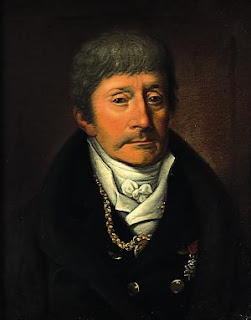
From the last years of his life in the 1820s it has been rumored he "killed Mozart", and, since these rumors were first circulated, better-informed people have known that he in fact had no role in the death of Mozart. Scholars and cognoscenti, excited by the opportunity for pedantry, greeted Peter Shaffer's play, and the movie that came of it, Amadeus, with huge hostility, with some of the criticism reaching a level of childish vituperation that continues to this day, mostly focused on the movie version, which differs in some details from the play (though not, as I recall, greatly). The criticism is largely overblown, bordering on ridiculous.
The fact is, no one seems to remember that the story is told entirely from Salieri's point of view while he's being interviewed by a priest in a mental institution! There is no dramatic or logical reason that the facts of the movie should be literally accurate. About the worst that you could say of it is that it is not the sort of thing even a mental patient of the early 19th century would invent, but that's debatable. Mental patients can invent all sorts of things. Salieri did in fact attempt suicide in his last years, and I believe I've read it is true (I'm not sure) that he spent some of his time in what passed for a mental hospital in those days. So perhaps the movie's historical accuracy should be judged only in its first few minutes, before Salieri begins to tell his tale.
Besides, even as the movie tells the tale, Salieri doesn't really murder Mozart, at least not in any clear cut fashion. Salieri's role in Mozart's death is debatable, even given the facts of this tale told by a madman. Basically, Salieri keeps Mozart up a bit past his bed time while he's ill--on the orders of a fictional patron and promises of money. Murder? I doubt in most courts of law.

If you're one of those who know Salieri as Mozart's killer, I hope you will reconcile yourself to him and listen with an open mind to this piano concerto, which is a masterpiece. If you're rushed for time, listen to the second movement at the very least:
Antonio Salieri: Piano concero in C major
I Solisti Veneti, Claudio Scimone
Aldo Ciccolini, piano
- Allegro maestoso
- Larghetto
- Andantino




